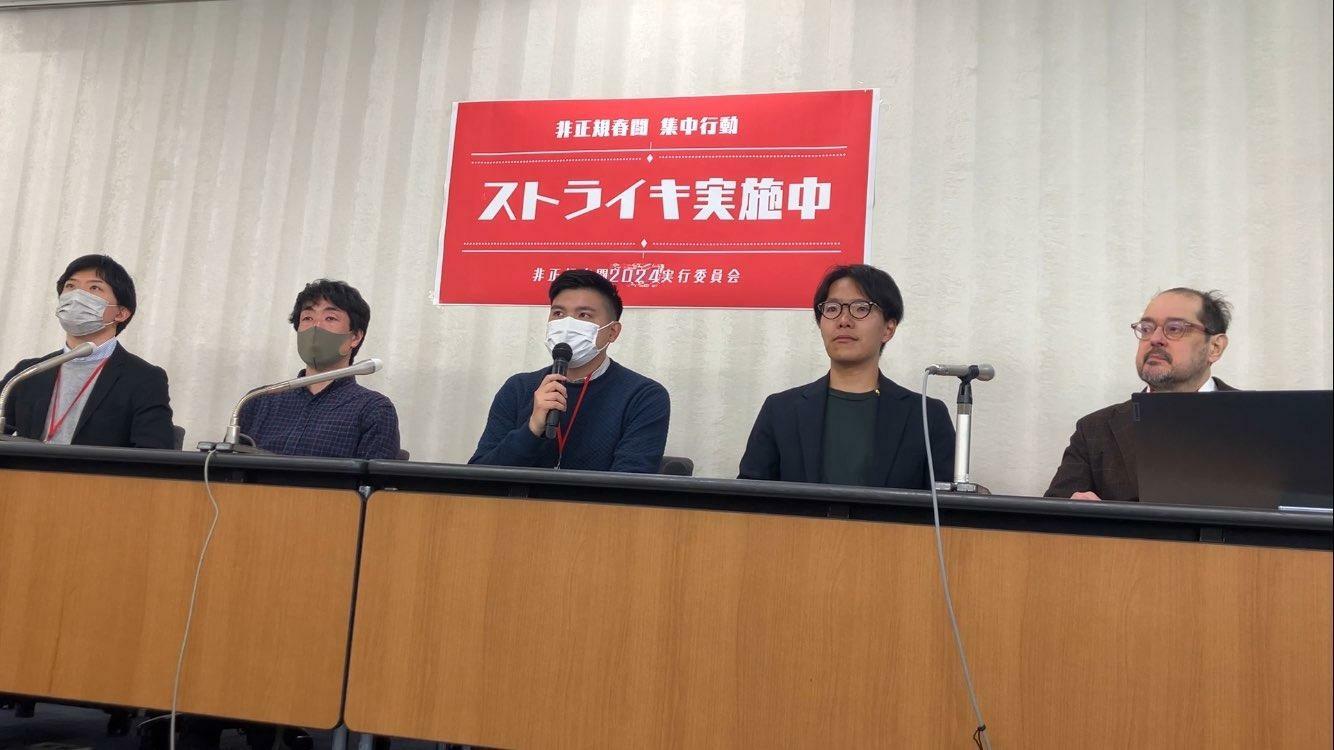This article was originally featured on Yahoo News. Written by Haruki Konno.

今日3月13日は春闘の集中回答日だ。今年の春闘は大企業正社員の賃上げを中心に、「早期回答」「満額回答」「大幅賃上げ」など景気の良い言葉が並ぶが、そうした実感のない人も多いのではないだろうか。
This article was originally featured on Yahoo News. Written by Haruki Konno.

今日3月13日は春闘の集中回答日だ。今年の春闘は大企業正社員の賃上げを中心に、「早期回答」「満額回答」「大幅賃上げ」など景気の良い言葉が並ぶが、そうした実感のない人も多いのではないだろうか。
Tokyo, Feb. 9, 2024 – Tozen Union
On Monday 4th December 2023, members of Tozen’s Gaba local took to the streets to protest and fight for their wellbeing.
The video below includes speeches from organiser Louis Carlet, Gaba local President Musashi Sakazaki, and Gaba local General Secretary Mitch Brown.
 From the notes on the show:
From the notes on the show:As seen on Reddit:
In April of 2020, the Japanese government amended local civil service law, reclassifying direct hire ALTs at public schools as “fiscal year appointees.” This so-called reform stripped these ALTs, and all others who labour under the new classification, of their trade union rights. Fiscal year appointees in the new system can no longer demand collective bargaining, conclude agreements with management, or enter into labour disputes. As a result, our ALTs who work for the Tokyo Board of Education were stripped of their right to collective bargaining.
2020年4月、日本政府は地方公務員法を改正し、公立学校において直接雇用されているALT講師を「会計年度任用職員」に再分類しました。 この変更は、これらのALT講師と、新しい分類の下で働くすべての労働者から労働組合の権利を剥奪するものでした。この新しい制度の下では、会計年度任用職員は団体交渉を要求したり、経営陣と協定を締結したり、労働争議をすることができなくなります。その結果として、東京教育委員会に勤務するALT講師は団体交渉権を剥奪されました。
Tozen Union is fighting back.
東ゼン労組はこれに闘います。
私たちの闘いの応援と、寄付をお願いします!
Please support our fight and donate:
https://www.call4.jp/info.php?type=items&id=I0000116
東ゼン労組は、そごう・西武労働組合(寺岡泰博執行委員長)が、
親会社セブン&アイ・ホールディングスは、そごう・
東ゼン労組も現在、
全国一般東京ゼネラルユニオン(東ゼン労組)
The original article can be found here.
大手英会話教室で起きたストライキ インボイス、負担増めぐり綱引き
英会話教室「Gaba」の講師、阪崎武蔵さん(45)は、教室の運営会社から届いた一通の英文メールを見て目を丸くした。
10月1日以降も同様に取引を継続するために、インボイス発行者への登録を義務づけます――。
とてもやすやすと受け入れられる内容ではなかった。
阪崎さんは週4~5日Gabaで講師として働く。その月収の約16万円に加え、カメラマンの仕事もしているが、年収は250万~300万円ほどだ。最近は物価が上がっているから、相対的に生活は苦しさを増す。
Gabaの場合、運営会社は阪崎さんら講師を雇用するのではなく、英語を教える業務を委託する契約形態を採っている。それによって、講師は仕事以外の関心事を自由に追いかけることができる、と運営会社はホームページで説明している。
報酬は、レッスンサービスの対価などという形で支払われる。
消費税は売り上げに含まれる消費税から仕入れに含まれる消費税を控除して納める仕組み。レッスンサービスの対価には消費税が含まれるため、運営会社はその分だけ税控除を受けることができた。
しかし10月以降、この税控除を受けるためには、運営会社は講師から「インボイス」(適格請求書)の発行を受ける必要が生じる。
インボイスが発行できるのは、消費税の納税義務がある「課税事業者」だけ。阪崎さんら講師の多くは年間売り上げが1千万円以下で納税が免除されている一方、インボイスは発行できない「免税事業者」だ。
運営会社から阪崎さんら講師に、冒頭のメールが届いたのは今年3月。免税事業者が取引先だと、運営会社は税控除が受けられず負担が増してしまうから、講師はインボイス発行者として登録してほしい、というのがその趣旨だった。
運営会社の求めに応じて、インボイスを発行するために課税事業者になれば、これまで免除されてきた消費税の納税義務が生じる。
阪崎さんの場合、新たな納税による負担は1回分の帰国費用に相当する。母国のアメリカではがんの治療を受ける78歳の母が待つが、会う頻度を減らさざるを得ない。
運営会社は登録した講師に対し、時間帯や講師のレベルによっては1コマの報酬を20円値上げするという。ただ、報酬の最低ラインが1500円であることを考えると、新たな負担分を賄うには不十分だという。
課税事業者にならなければ、将来的には契約を解除される道しか残されていない。インボイス制度への登録は「強制」にほかならない。阪崎さんはそう感じている。
「目先のわずかな昇給で、急いで登録させようとすることが、不誠実だと感じた。従わない者はいなくなって構わないという姿勢も悲しい」と阪崎さん。
講師の一部は7月に3回にわたり一日中授業をしないストライキに踏み切り、東京・有楽町でデモを開いて「インボイス制度に登録することを強要しないで」などと声をからした。運営会社に対しては団体交渉も続ける。
だが、進展はない。
「登録しないと契約を切るのはあまりにひどい。大好きな生徒たちのためにも続けたいが、フェアな環境でなければ難しい」。阪崎さんは現在、日本を離れることも視野に入れる。
ただ、運営会社側の台所事情も切実だ。「GABA」によると、同社と業務委託契約を結ぶ講師は約800人。1レッスン(40分)あたりの単価(1500~2400円)は「同業他社を上回る契約条件」だという。
同社によると、講師がインボイス制度に登録しない場合でも、半年間の契約を結べる。ただ、それは「期間中の検討猶予をもって判断いただけるよう設定」したもので、1回限り。期間が過ぎてなお制度への登録がなければ、契約解除となる。
同社は「講師が免税事業者のままとなった場合、仕入れ税額控除を受けることができない。新たに税負担をすることが、現状は難しいと判断した」という。
制度に登録した講師に対して1コマの報酬を20円値上げした狙いは、「税額負担感が強いと思われる報酬対象者に対し、少しでも負担感を軽減できれば」。
インボイス制度への導入手続きの中止を求められていることについては、「弊社としても導入にあたり講師へご理解をいただけるよう努めたい」とした。(前田健汰)
Tozen Union and its local Gaba Workers Union protested today (Tuesday, July 18, 2023) in front of language school Gaba’s Fujisawa Learning Studio.
A dozen teachers braved searing heat on the streets of Fujisawa, demanding a 200/yen per lesson raise and that Gaba stop pushing instructors to register as an “invoice-issuing business.” The language school does this to shift a new tax burden onto its low-paid teachers who would have to pay consumption tax they are currently exempt from paying. The company threatens lower pay and even firing to those instructors who fail to comply.
The company already treats instructors as private businesses on gyomu itaku contracts in order to avoid all obligations under labor law. The company claims to outsourceg its main business – teaching English. It’s not clear then what Gaba does as its business.
Gaba instructors have not had a raise since 2008, and and need one now more than ever due to recent inflation.
For more info on how to support us, contact union rep Louis Carlet at tozen.carlet@gmail.com.